![]()
Huf
Johann Huf (geboren Januar 1803) heiratete Anna Christina Grüning (geboren Mai 1812) am 18. März 1832 in Schwersenz (heute die polnische Stadt Swarzedz), ein paar Kilometer westlich von der Stadt Nekla, wo sie beide geboren waren, in der Preußischen Provinz Posen. Sie hatten fünf Kinder, das erste Kind starb. Sie waren fromme Lutheraner, und waren nicht einverstanden mit der Religionspolitik des preußischen Staates.
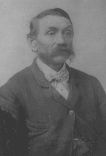 Johann Huf |
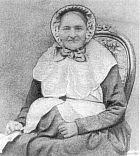 Christina Huf |
Die Hufs und andere aus der Nekla-Gegend trafen Vorbereitungen für die Auswanderung nach Südaustralien, wohin andere aus ihrer Region schon gereist waren. Am 15. Juli 1846 bekamen die Hufs ihre Reisegenehmigung, die ihnen Regierungserlaubnis zur Auswanderung gab, und die auch klar machte, dass sie durch diese Genehmigung ihre preußische Staatsbürgerschaft verloren hatten (ein ziemlich großer Schritt). Sie segelten von Bremerhaven auf der Heloise, einem Schiff, das der Auswanderungsagent für Südaustralien in Bremen Eduard Delius gechartert hatte. Christina Huf bekam einen Sohn nach drei Monaten auf dem Schiff, in der Nähe vom Kap der Guten Hoffnung. Dieser Sohn August war zwei Monate alt, als das Schiff am 17. März 1847 Port Adelaide erreichte. Die Hufs zusammen mit einigen anderen Einwanderern zogen nach Bethanien im Barossa-Tal, und nach ein paar Monaten dort zogen sie nach Hoffnungsthal weiter, auch im Barossa-Tal.
In Hoffnungsthal wurde es bald klar, dass Johann seinen Bauernhof nicht viel vergrößern könnte, und dass er niemals das Land besitzen könnte, das er pachtete. Also reisten die Hufs und andere aus Hoffnungsthal und Rosenthal über Land in den Südwesten Victorias, wo man gutes Land bald kaufen könne, wie sie gehört hatten.
Sie machten mehrere Anträge auf Land in der Hamilton-Gegend, aber man sagte ihnen jedesmal, dass das Land nicht verfügbar sei. Schließlich gerieten die Deutschen, die in Portland aus Südaustralien angekommen waren, in finanzielle Schwierigkeiten. Johann konnte weder lesen noch schreiben, und Michael Deutscher schrieb am 15. Februar 1853 einen Brief an den Lieutenant Governor:
| The German congregation at Portland Bay, We ask you, the honorable Excellency the Lieutenant Governor, to forgive us for our bold request when we as British subjects ask for help from you honorable Excellency in the hope, that our Lord Governor will listen to us most graciously. In the year 1851 a group of Germans from Adelaide, and consisting of more than 300 souls applied for land in this Colony near Portland to the honorable Excellency, the Governor. The answer, which they received was not to their liking and they gave up their plans. However, our group of ten families, altogether 50 souls, decided to comply with the Melbourne laws and to go to the Colony at Portland. We are all farmers (agricultural) and came in May 1852 cross country from Adelaide to Portland bringing with us all our animals (cattle, horses, etc.) and implements and tolls. Through our representatives M. Deutscher and J. Huf we have applied four times for land, suitable for cultivation. So far we have not achieved anything and there have been no sales of land, suitable for wheat farming in the area. We have lived for nine months here in and around Portland in rented premises, waiting for land. We have lost half of our draught animals and soon will not be able to keep the remaining few beasts, because we have no fodder. In Adelaide we lived amongst German colonists and therefore most of us do not yet speak English. This is the reason why only a few have been able to find work (and earn some money), the rents for houses are steadily increasing and most of the time accommodation is not at all available. We will not be able to hold out much longer in this situation. Most of us do not know any other work but agriculture, and we ask most obediently and humbly as servants of your honorable Excellency that you will offer for sale in the near future the land, which we have indicated in the enclosed application. It is situated in the County of Hamilton. Does not the Melbourne law state that land should be offered for sale as often as there is a demand for it? The names of the people asking for land, are as follows: |
||
| Gotthelf Petschel Wilhelm Petschel Carl Petschel Andreas Burger Johann Burger |
Michael Schmidt Gottfried Schneider Johann Hundrack Johann Rentsch Johann Mirtschin |
Andreas Albert Andreas Deutscher Michael Deutscher Johann Huf |
If your Excellency will see fit to grant our request most graciously we would like to ask for your favourable reply as soon as possible. We will forever remain as your most obedient and faithful subjects and servants Signed by the chairman of the congregation Michael Deutscher |
||
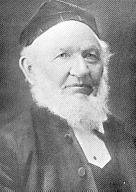 Im
Mai 1853 kam Pastor Clamor Schürmann aus Südaustralien an, um für die
religiösen Bedürfnisse der Lutheraner im Südwesten Victorias zu sorgen.
Die Deutschen freuten sich sehr, ihn zu sehen. Schließlich konnten sie spät
im Jahre 1853 Land kaufen, und Johann Huf und seine Familie waren die erste
deutsche Familie, die sich permanent in der Hamilton-Gegend niederließ.
Pastor Schürmann siedelte sich auch in der Gegend um Hamilton an und spielte
eine große Rolle in der lutherischen Geschichte im Südwesten Victorias.
Jahrelang besuchte er Gemeinden verstreut über ein sehr großes Gebiet; er
reiste jedes Jahr mit dem Pferd über Land zwischen Hamilton, Portland, Warrnambool
und Geelong. Am 14. November 1853 machte Johann Huf im Alter von 50 Jahren
seinen ersten Landkauf in seinem Leben. Im
Mai 1853 kam Pastor Clamor Schürmann aus Südaustralien an, um für die
religiösen Bedürfnisse der Lutheraner im Südwesten Victorias zu sorgen.
Die Deutschen freuten sich sehr, ihn zu sehen. Schließlich konnten sie spät
im Jahre 1853 Land kaufen, und Johann Huf und seine Familie waren die erste
deutsche Familie, die sich permanent in der Hamilton-Gegend niederließ.
Pastor Schürmann siedelte sich auch in der Gegend um Hamilton an und spielte
eine große Rolle in der lutherischen Geschichte im Südwesten Victorias.
Jahrelang besuchte er Gemeinden verstreut über ein sehr großes Gebiet; er
reiste jedes Jahr mit dem Pferd über Land zwischen Hamilton, Portland, Warrnambool
und Geelong. Am 14. November 1853 machte Johann Huf im Alter von 50 Jahren
seinen ersten Landkauf in seinem Leben. |
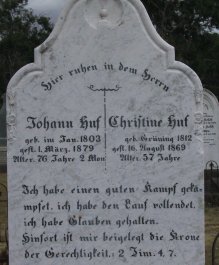 Huf-Grabstein, Friedhof von Sth Hamilton |
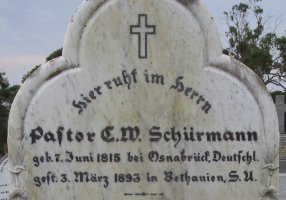 Schürmann-Grabstein, Friedhof von Sth Hamilton |
(Dank an Betty Huf für Informationen)
| Oben | Zurück
| Chronologie | Themen
| Schüler | Site-Übersicht
| in English |
| Primärquellen | Bibliographie
| Suche |
German Australia © D. Nutting 2001